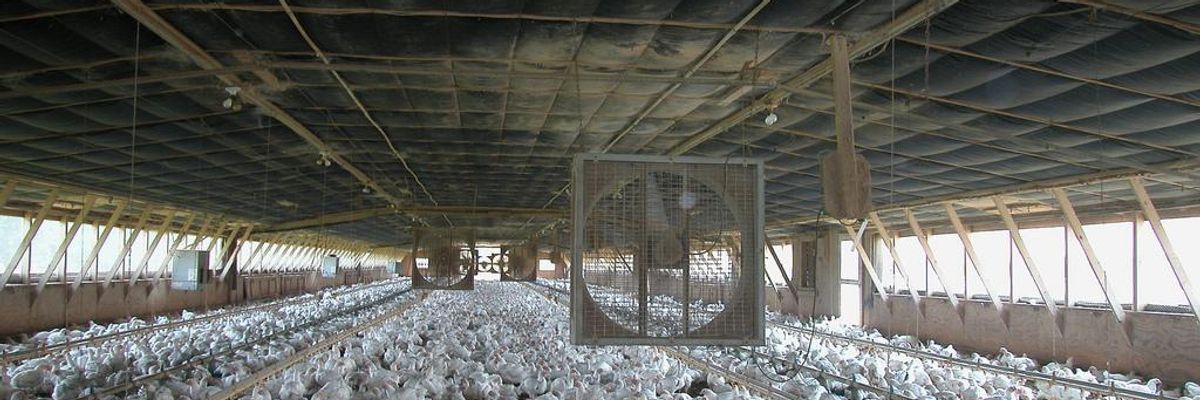
The poultry industry is the biggest user of crop-based feed, using more than 40 percent of the world's feed in 2009. (Photo: Socially Responsible Agricultural Project/Flickr/cc)
Global Demand for Meat Amounts to 'Appetite for Destruction,' Says New Study
Report points to massive need for land to grow feed crops as an overlooked cost of industrial farming
In a study titled "Appetite for Destruction," the World Wildlife Fund (WWF) revealed on Thursday that humans' consumption of meat is having a devastating impact on global biodiversity in a way that's too often considered.
In addition to causing greenhouse gas emissions and using up huge quantities of water and land, industrial farming requires massive amounts of crop-based feed for animals, which puts "an enormous strain on our natural resources and is a driving force behind wide-scale biodiversity loss."
If the global appetite for meat grows as expected, says the report, "it's estimated that soy production would need to increase by nearly 80% to feed all the animals destined for our plates."
The industrial farming sector is also having a negative impact on humans' health, as a reliance on feeding animals crops like corn and soy has been linked to a lack of healthy omega-3 content in the meat people eat.
"You'd have to eat six intensively reared chickens today to obtain the same amount of the healthy omega-3 fatty acid found in just one chicken in the 1970," says the study. "The majority of calories from chicken come from fat as opposed to protein."
The study points to a number of vulnerable parts of the earth, including the Amazon, the Yangtze and Mekong river basins, and the Himalayas as already suffering from major strain as food producers look for places to grow feed crops, while being inadequately protected by conservation efforts. Thousands of species living in these regions would be at risk if more manufacturers were to look to them for crop production.
The study stresses that while there is plenty of food to feed the human population, more efficient and fair systems of distributing food are needed to ensure that these areas are not overrun by feed crop producers.
"We already produce enough to feed the world," reads the report. "But over-consumption, inequality, waste, and inadequate production and distribution systems stand in the way of enough food for everyone and space for wildlife."
The WWF says that simple portion control would go a long way in reducing animal farming's impact on the earth:
If everyone reduced the amount of animal products that they ate to meet their nutritional requirements, the total agricultural land required would decline by 13 percent...An area 1.5 times the size of the European Union--would be saved from agricultural production.
As a potential innovation that could save much of the earth's biodiversity, the study also points to alternative feed options that don't need the vast areas of land required by crops like soy beans and corn.
"We believe it's possible, and essential, to change food production systems and consumption patterns to secure enough nutritionally complete and environmentally sustainable food for everyone on Earth," says the report.
An Urgent Message From Our Co-Founder
Dear Common Dreams reader, The U.S. is on a fast track to authoritarianism like nothing I've ever seen. Meanwhile, corporate news outlets are utterly capitulating to Trump, twisting their coverage to avoid drawing his ire while lining up to stuff cash in his pockets. That's why I believe that Common Dreams is doing the best and most consequential reporting that we've ever done. Our small but mighty team is a progressive reporting powerhouse, covering the news every day that the corporate media never will. Our mission has always been simple: To inform. To inspire. And to ignite change for the common good. Now here's the key piece that I want all our readers to understand: None of this would be possible without your financial support. That's not just some fundraising cliche. It's the absolute and literal truth. We don't accept corporate advertising and never will. We don't have a paywall because we don't think people should be blocked from critical news based on their ability to pay. Everything we do is funded by the donations of readers like you. Will you donate now to help power the nonprofit, independent reporting of Common Dreams? Thank you for being a vital member of our community. Together, we can keep independent journalism alive when it’s needed most. - Craig Brown, Co-founder |
In a study titled "Appetite for Destruction," the World Wildlife Fund (WWF) revealed on Thursday that humans' consumption of meat is having a devastating impact on global biodiversity in a way that's too often considered.
In addition to causing greenhouse gas emissions and using up huge quantities of water and land, industrial farming requires massive amounts of crop-based feed for animals, which puts "an enormous strain on our natural resources and is a driving force behind wide-scale biodiversity loss."
If the global appetite for meat grows as expected, says the report, "it's estimated that soy production would need to increase by nearly 80% to feed all the animals destined for our plates."
The industrial farming sector is also having a negative impact on humans' health, as a reliance on feeding animals crops like corn and soy has been linked to a lack of healthy omega-3 content in the meat people eat.
"You'd have to eat six intensively reared chickens today to obtain the same amount of the healthy omega-3 fatty acid found in just one chicken in the 1970," says the study. "The majority of calories from chicken come from fat as opposed to protein."
The study points to a number of vulnerable parts of the earth, including the Amazon, the Yangtze and Mekong river basins, and the Himalayas as already suffering from major strain as food producers look for places to grow feed crops, while being inadequately protected by conservation efforts. Thousands of species living in these regions would be at risk if more manufacturers were to look to them for crop production.
The study stresses that while there is plenty of food to feed the human population, more efficient and fair systems of distributing food are needed to ensure that these areas are not overrun by feed crop producers.
"We already produce enough to feed the world," reads the report. "But over-consumption, inequality, waste, and inadequate production and distribution systems stand in the way of enough food for everyone and space for wildlife."
The WWF says that simple portion control would go a long way in reducing animal farming's impact on the earth:
If everyone reduced the amount of animal products that they ate to meet their nutritional requirements, the total agricultural land required would decline by 13 percent...An area 1.5 times the size of the European Union--would be saved from agricultural production.
As a potential innovation that could save much of the earth's biodiversity, the study also points to alternative feed options that don't need the vast areas of land required by crops like soy beans and corn.
"We believe it's possible, and essential, to change food production systems and consumption patterns to secure enough nutritionally complete and environmentally sustainable food for everyone on Earth," says the report.
In a study titled "Appetite for Destruction," the World Wildlife Fund (WWF) revealed on Thursday that humans' consumption of meat is having a devastating impact on global biodiversity in a way that's too often considered.
In addition to causing greenhouse gas emissions and using up huge quantities of water and land, industrial farming requires massive amounts of crop-based feed for animals, which puts "an enormous strain on our natural resources and is a driving force behind wide-scale biodiversity loss."
If the global appetite for meat grows as expected, says the report, "it's estimated that soy production would need to increase by nearly 80% to feed all the animals destined for our plates."
The industrial farming sector is also having a negative impact on humans' health, as a reliance on feeding animals crops like corn and soy has been linked to a lack of healthy omega-3 content in the meat people eat.
"You'd have to eat six intensively reared chickens today to obtain the same amount of the healthy omega-3 fatty acid found in just one chicken in the 1970," says the study. "The majority of calories from chicken come from fat as opposed to protein."
The study points to a number of vulnerable parts of the earth, including the Amazon, the Yangtze and Mekong river basins, and the Himalayas as already suffering from major strain as food producers look for places to grow feed crops, while being inadequately protected by conservation efforts. Thousands of species living in these regions would be at risk if more manufacturers were to look to them for crop production.
The study stresses that while there is plenty of food to feed the human population, more efficient and fair systems of distributing food are needed to ensure that these areas are not overrun by feed crop producers.
"We already produce enough to feed the world," reads the report. "But over-consumption, inequality, waste, and inadequate production and distribution systems stand in the way of enough food for everyone and space for wildlife."
The WWF says that simple portion control would go a long way in reducing animal farming's impact on the earth:
If everyone reduced the amount of animal products that they ate to meet their nutritional requirements, the total agricultural land required would decline by 13 percent...An area 1.5 times the size of the European Union--would be saved from agricultural production.
As a potential innovation that could save much of the earth's biodiversity, the study also points to alternative feed options that don't need the vast areas of land required by crops like soy beans and corn.
"We believe it's possible, and essential, to change food production systems and consumption patterns to secure enough nutritionally complete and environmentally sustainable food for everyone on Earth," says the report.

